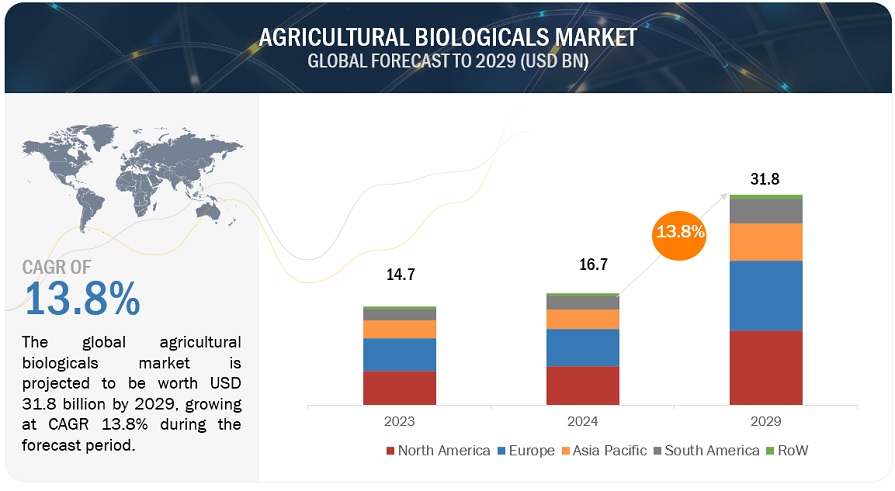The global agricultural biologicals market is projected to grow from USD 16.7 billion in 2024 to USD 31.8 billion by 2029, representing a compound annual growth rate (CAGR) of 13.8% during this period. As concerns about the impact of traditional chemical-based agriculture increase, there is a significant shift towards sustainable farming practices. Agricultural biologicals encompass biopesticides, biofertilizers, and biostimulants, all of which serve as eco-friendly alternatives. The excessive use of chemical pesticides has led to resistance development in various pests and pathogens. In this context, agricultural biologicals offer alternative modes of action that can be integrated into pest management programs, helping to mitigate the risk of resistance.

The market for semiochemical-based agricultural biologicals is projected to achieve the highest CAGR among source segments during the forecast period.
Semiochemicals are naturally occurring compounds that influence pest behavior by disrupting mating, feeding, and other communication processes. Unlike traditional pesticides, semiochemicals specifically target harmful pests without affecting beneficial insects or the surrounding environment, making them valuable tools in integrated pest management (IPM) programs. The growing adoption of IPM practices and the increasing need for precise pest control solutions are driving the demand for semiochemicals. Additionally, advancements in formulation technologies that enhance stability and delivery will contribute to the growth of the semiochemicals market. Key advantages of semiochemicals, such as reducing pest resistance and offering potential long-term pest control solutions, make them increasingly adaptable in various agricultural settings.
Download PDF Brochure: https://www.marketsandmarkets.com/pdfdownloadNew.asp?id=100393324
The fruits and vegetables segment is projected to dominate the market share throughout the forecast period.
Biologicals play a crucial role in managing the unique and intense pest and disease pressures faced by fruits and vegetables. These crops are often more susceptible to various pests and diseases than others, making the use of biologicals a sustainable and eco-friendly alternative to traditional chemical products for pest control. This category includes beneficial microbes and natural compounds that provide targeted control, minimize chemical residues, and enhance soil health. Additionally, the rise in consumer demand for safer and organic produce aligns perfectly with the use of biologicals. Given the high value of fruits and vegetables, investing in biological solutions is essential to achieving optimal yields and maintaining quality.
Natural Products Segment Expected to Secure Second Place in Agricultural Biologicals Market Share by Source.
Natural products are expected to secure the second position in the agricultural biologicals market by source segment. These products, which are sourced from plants, animals, or microorganisms, play a crucial role in pest regulation, soil health enhancement, and disease management, all without the negative effects associated with synthetic chemicals. Their popularity is increasing due to rising consumer demand for residue-free and organic produce, along with regulatory support for sustainable practices and growing environmental concerns. While other biological and synthetic methods also contribute to the market, natural products are integral to integrated pest management and soil fertility programs, establishing their central role within the agricultural biologicals sector.
The Asia-Pacific Agricultural Biologicals Market is Set for Continuous Growth Throughout the Forecast Period.
The demand for food is rising, supported by a robust and evolving agricultural sector and significant investments in modern farming technologies. As a result, agricultural biologicals are becoming increasingly popular in countries like China, India, and Southeast Asian nations, aimed at boosting farm productivity and sustainability. Additional factors driving this trend include the growing consumer preference for organically grown and residue-free crops, government support for sustainable farming practices, and heightened awareness of the environmental advantages of biological products over synthetic chemicals. Furthermore, the increasing focus on soil quality and the corresponding rise in eco-friendly pest control methods are contributing to the growing popularity of biological solutions. Consequently, the outlook for the Asia-Pacific market is one of substantial growth, highlighting the importance of biologicals in the evolving agricultural landscape.
Top Agricultural Biological Companies:
- BASF SE (Germany)
- Syngenta Group (Switzerland)
- FMC Corporation (US)
- Corteva (US)
- Bayer AG (Germany)
- UPL (India)
- Nufarm (Australia)
- Novozymes A/S (Denmark)
- Lallemand Inc (Canada)
- Mosaic (US)
- Rovensa Next (Spain)
- Sumitomo Chemical Co., Ltd (Japan)
- SEIPASA, S.A. (Spain)
- Koppert (Netherlands)
Schedule a call with our analysts to discuss your business needs: https://www.marketsandmarkets.com/speaktoanalystNew.asp?id=100393324